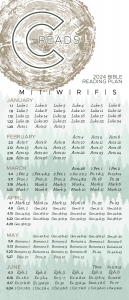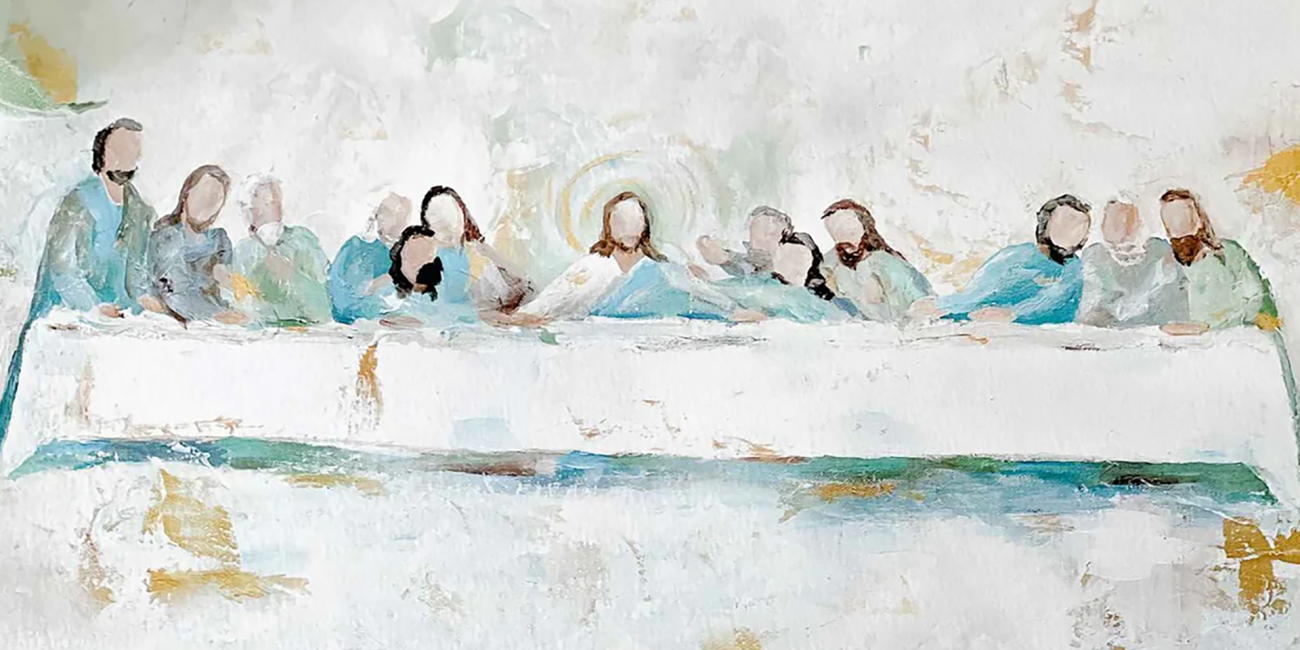BIBLE INSIGHTS
Here's some tips, suggestions, and insights to reading scripture.
WELCOME TO THE
2024 BIBLE READING PLAN!
We know that reading the bible can be tricky. It’s a big book, it’s thousands of years old from a number of cultures very different than ours, and it can be very confusing at times. It can be so daunting to think about reading – that a lot of people just don’t think about reading it. So we’re going to try to change that with this bible reading plan.
The bible can be difficult to read – it’s true – but it is made easier by having a ‘plan’ to stick to, and while reading it with other people. So we invite you to read along with us this year!
The plan is to read 6 days per week (Sundays are off to ‘catch up’), and each day is usually one chapter of reading (sometimes more). If at first it seems like a lot, you’ll get used to it and figure out what works for you. Stick with it. By the end of the year, you’ll have read almost all of the New Testament and a ‘greatest hits’ of sorts from the Old.
Sometimes you’ll get what is happening but will be puzzled by certain details. Sometimes you’ll be so puzzled by what’s happening that you don’t even notice the details! Take some notes, write down some questions, ask someone who you trust in faith. And by all means, utilize the Bible Project resources and whatever we post here on this page.
Oh – and pray. Pray that God will speak to you through his Word!
The Basics
The bible is often called “the good book” – but it’s not really a ‘book’ at all. In fact, it’s a collection of books that are bound up in one ‘book’. In fact, the word ‘bible’ comes from the ancient Greek word ‘ta biblia’, meaning “the books”. So it’s really an anthology, a collection of books – or really – of sacred writings that cover multiple genres of literature.
There’s two big divisions in the bible: the Old and New Testaments. The Old Testament, also referred to as the Hebrew Bible or Jewish Scriptures, is the story of the world from the perspective of God’s dealings with the Jewish people. It contains ancient Hebrew poetry, meditation literature, narrative, history, law, songs, wisdom writings, and more. It is a diverse collection, written over (approximately) 1000 years. The New Testament, on the other hand, was written over the course of about 50 years – and is very concentrated on Jesus, and the movement he spawned through the Spirit (the church / Kingdom of God on earth!). It is a collection of (mostly) two kinds of writings: theological narrative (the gospels and Acts) and letters. There’s also something like extended sermons (Hebrews, James), along with the exciting (and often confounding) apocalyptic literature called Revelation (no “s” on the end!).
The important thing about the bible is, however, that it is not just a regular human book. It was written by humans, but in a way that is difficult to explain, it was also written by God. We believe that, through God’s Spirit, God guided its writing and production – and speaks his voice through its words still today.
We also believe that, at its core, it is a (true) story that points to Jesus. And since Jesus is central at Central, the bible is pretty central as well! That’s why Central Reads together!

Check out the resources from the Bible Project!
The Bible Project has produced a series of videos called “Learn How To Read the Bible“, and it’s pretty good at doing exactly what it says it does! So go to the series and start to dig in (or see below)…and while you’re there, explore their amazing resources.
Below, you’ll find two different sets of questions to aid you in reading scripture. They are nothing more than helpful tools to get you on your way. Give them a try as you read!
These questions are about applying the bible to our everyday lives. When you get the hang of asking these questions, it becomes a profound way of reading scripture.
1. What does today’s passage actually say? (What happens, who’s speaking, what are the facts?)
2. What are some lessons? (Is there an example I should follow, a warning to heed, a principle to take away, a promise to hold on to?)
3. What might God be saying to me through it? (Turn the lessons from #2 into questions to pose to yourself)
These questions are geared towards learning new insights to God, ourselves, and others – and the relationship between them. Once you answer all three questions, draw conclusions about how we’re called to believe and live differently because of them.
1. What does this passage say about God?
2. What does this passage say about me?
3. What does this passage say about others around me?

Click above to download the 2024 bible reading plan – or grab a hard copy next time you’re at Central – and tuck it in your bible!
Follow the instructions on this video to get the daily readings on your iPhone with one simple click each day. (Basically, you make a shortcut/link to the daily reading page on your home screen.)
BOOKS ON THE BIBLE:
Below is a list of recommended books about the bible. We don’t endorse every word in these books, but they each give important perspectives and insights into the bible.
- A Walk Through the Bible, Lesslie Newbigin
Newbigin was an amazing theologian and missionary. This book is actually a series of radio addresses that tell the story of the bible. It is short and sweet, but gives a wonderful overview of the story of scripture. - The True Story of the World, Craig G. Bartholomew & Michael W. Goheen (or its slightly bigger/more in-depth older brother, The Drama of Scripture)
Tells the whole arc of the bible as a 6-act story. It is an excellent overview of the bible. Highly recommended. The Drama of Scripture is a larger version of it, that was originally designed for an “Intro to Biblical Theology” course. - The Last Word, N.T. Wright
A book about scripture, how we understand it, how it’s been read in history, and most importantly, how the bible is authoritative. It is excellent, accessible, and from one of the best biblical scholars going. - About the Bible: Short Answers to Big Questions, Terence Fretheim
A fun book with very thoughtful responses to the most common bible questions (Who wrote the bible?, Should the bible be interpreted literally?, What about Genesis and science?, and so on). - How to Read the Bible For All Its Worth, Gordon Fee & Douglas Stuart
A classic book on how to understand different parts of the bible, understanding history and context, and so on. Wonderful and helpful if you are really trying to read and understand the bible for yourself. - How (Not) to Read the Bible, Dan Kimbell
Tackles many of the bible’s most difficult issues and common objections (science, place of women, violence, slavery, and so on)…oh, and unicorns.
WEB RESOURCES:
Below is a list of web resources about the bible. We don’t endorse every word here either, but they each give important perspectives and insights into the bible.
- The Bible Project (bibleproject.com) – this is simply the best out there for understanding scripture. Free, creative, culturally relevant, and biblically faithful. They’ve got videos on each book of the bible, biblical themes, and a lot more, as well as free classes, articles, and more.
- N.T. Wright (ntwrightpage.com & ntwrightonline.org) – Wright is one of the most important biblical scholars of our time (one of my favorites, and most important in my reading and thinking – Matt), and these two websites put his work, lectures, articles, and classes out there for us to enjoy.
- The Bible Gateway (biblegateway.com) – read the bible in every translation ever (almost!), side by side, with resources, and more.
BIBLE BLOG
-
The Value of Light
By Rebecca DeLucia, Next Generation Pastor Over spring break last week my 5 year old nephew
-
Carrying the Cross
A guest blog by Shawn Blythe There may be no more poignant reminder of the ways by which we cross paths
-
Maundy Thursday Reflections
A guest blog by Shawn Blythe The events of the Thursday before the crucifixion centered around the Passover meal that has
BIBLE VIDEOS
BIBLE VIDEOS
Throughout the year, we’ll post some videos to give some commentary, perspective, and help with reading the bible. Check back here regularly – or stay tuned on social media for these videos as well.
VIDEOS FROM THE BIBLE PROJECT
VIDEOS FROM THE BIBLE PROJECT
The Bible Project is a non-profit organization whose mission is to help people read and understand the bible as a unified story that leads to Jesus. They produce phenomenal – and free – resources to help people read the bible like this, while maintaining artistic, theological, and scholarly integrity. They’ve produced introduction videos to each book of the bible, which you can check out on their page (OT | NT) or right here for each book (as we get to them).





